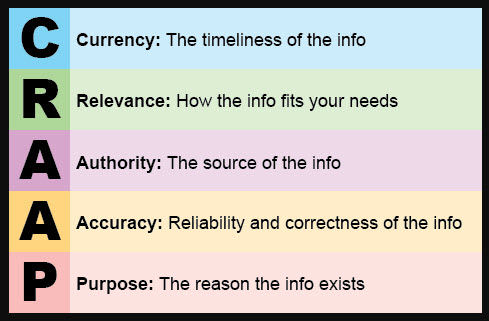We suggest applying two methods to check the reliability of your sources: Lateral Reading and the CRAAP test. You don't have to use both--you can use either. Lateral Reading is what professional fact checkers use to verify information.
Lateral reading is paradoxically the act of NOT reading a website in order to examine and investigate the website's content and information. Fact checkers, people who are paid to determine a website's bias and truthfulness, employ lateral reading techniques. Instead of determining a website's credibility through vertical reading (often through a CRAAP test); looking for date of publication, authorship, domain name, and bias, fact checkers quickly leave the site and open up new tabs in their browser to look for what others have said about the website being examined.
Lateral readers pay little attention to how the site appears, instead they quickly leap off a site and open new tabs. They investigate a site by leaving it.
source: Wineburg, S., & McGrew, S. (2017). Lateral reading: Reading less and learning more when evaluating digital information.
The following evaluation sources were suggested by Samantha Stanley.
Verify by opening new tabs in your browser, not new windows.
Snopes | Wikipedia | Google | AllSides | WebMii | bellingcat


CRAAP scorecard for evaluating sources. The categories for scoring include:
Each category can be scored from one to ten with one being the low score and ten being the high score. The higher the total score, the more reliable the website may be. Any source scoring below thirty might not be considered acceptable for academic research.
Courtesy of Pikes Peak Community College Library.